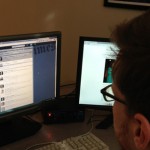 The notion that the web, and social networks in particular, have narrowed our perspectives is a well trodden one. The theory goes that because there is such diversity on the web, it’s incredibly easy to find those with whom our views match entirely, thus creating a very easy echo chamber.
The notion that the web, and social networks in particular, have narrowed our perspectives is a well trodden one. The theory goes that because there is such diversity on the web, it’s incredibly easy to find those with whom our views match entirely, thus creating a very easy echo chamber.
A recent study highlights how this bias can play out within a social network, with each extra hop along the way making the information shorter and more biased.
The authors, from the Max Plank Institute, believe the rise of social networking may be having a profound impact on how we perceive the news.
The study saw people play a variant of the Telephone game, whereby a message is passed from person to person, and the challenge is to ensure that it retains its original content by the end of its journey.
Rather than playing it amongst a small group of friends however, the study saw over a 100 participants in the game. The results showed how new, which in this case was about the risks involved with an antibacterial agent, became distorted as it passed along the chain.
This distortion was largely a result of the biases each person brought to the game.
What’s more, the larger the chain of people the message passed through, the shorter, and more distorted, the message became.
Of course, this isn’t the first exploration of how social networks influence the news. A recent study by academics at Penn State looked at how influential social media was as a source of soliciting political news.
“There seems to be growing concern that young people may be becoming more disengaged, particularly from mainstream media sources, and be more out-of-touch,” the researchers say.
“However, sharing and discussing news content on social media sites like Facebook can actually drive greater involvement with news and information.”
The researchers wanted to see just how engaged people were with stories they themselves had shared on Facebook. The results suggest that the engagement we receive from our friends plays a big part in how engaged we ourselves remain.
“One of the main findings of this study is that engagement in news stories through social media requires discussion with friends on the site,” the researchers say.
“Sharing the story does not increase involvement beyond just reading it on the original news website. Increased involvement depends on valuable feedback from friends.”
They went on to reveal that this feedback has to be substantial. Simply receiving likes is not enough, but if friends provide interesting commentary then it really helps to engage with the topic more deeply.
Our personal gatekeepers
The question then becomes whether when given more control over the news we consume, whether we tend to hunt down news that we agree with already, creating a kind of political echo chamber?
The perception is very much that those holders of extreme political opinions tend to be rather entrenched in their views, but recent research suggests that it is in fact those with moderate beliefs that are actually more susceptible to cognitive bias than their more extreme peers.
Indeed, another study goes as far as to suggest that those holders of more extreme positions (whether to the left or to the right) are actually smarter than their more moderate peers.
All of which suggests that those positions aren’t the result of blind heuristics but rather more measured thought and consideration. Of course, this is not without risk, as studies have also shown that the discussion of politics is one of the main reasons for de-friending someone, but maybe those aren’t the kind of ‘friends’ you’d want anyway?
I'm not surprised by this. I mean there isn't any such thing as a universal truth is there? We all apply our own spin and bring our own prejudices to information. It's no wonder things get distorted.